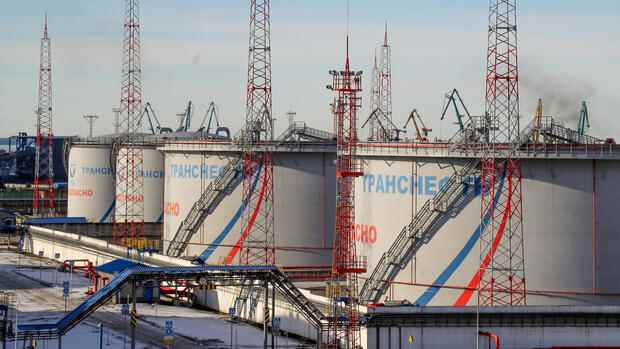The sea transport of crude oil and petroleum products of Russian origin should only be possible worldwide if the oil was bought below a certain price.
(Photo: dpa)
Berlin The finance ministers of the G7 of economically strong democracies want to push through a price cap on Russian oil. In a joint statement on Friday, which is available to the German Press Agency, they also called on all countries that import Russian oil to follow this measure. “We are aiming for a broad coalition to maximize effectiveness,” the paper said.
In essence, the aim is to force Russia to sell oil to large buyers such as India at a significantly lower price in the future. The hope is that this will ease the global oil markets and cushion the effects of the Ukraine war on energy prices. At the same time, Russia would no longer be able to benefit from rising oil prices and thus fill its war chest.
The sea transport of crude oil and petroleum products of Russian origin should only be possible worldwide if the oil was bought below a certain price. The price cap could work if the West linked important services such as insurance for oil transport to compliance with the regulation. These are largely in Western hands.
Chancellor Olaf Scholz (SPD) recently emphasized that a price cap only works if it is organized globally. EU Commission President Ursula von der Leyen also said on Thursday in the ZDF program “mabrit illner” that “a large number of international countries” was necessary. “It now seems to be becoming apparent that we will achieve this goal.” When asked if China was on board, she said, “Not everyone is on board.”
Top jobs of the day
Find the best jobs now and
be notified by email.
With the declaration, the G7 themselves committed themselves to quickly implementing the price cap in their own countries. In the EU, where an oil embargo against Russia has already been decided, all member states should agree first. The aim is to implement it within the time frame of the sixth EU sanctions package, it said.
The finance ministers of the G7 did not initially commit themselves to an exact upper price limit. It also depends on technical issues. The cover should be communicated transparently and its effect closely monitored.
More: Read all current developments in the energy crisis in the news blog
